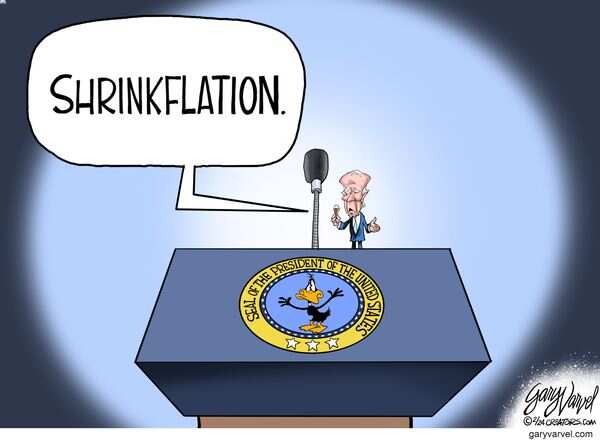Superbowl viewers were likely disgusted by a carefully placed ad by Team Biden, bizarrely focusing on shrinkflation. President Biden recently expressed his annoyance with shrinkflation in the Super Bowl ad, denouncing it as a “rip-off” and urging companies to cease this deceptive practice. It’s his latest bid to convince Americans that he understands their plight and, by golly, he’s on their side.
Shrinkflation is a tactic where manufacturers decrease the size or quantity of consumer goods while maintaining the same price, resulting in consumers paying more for less product. It’s been happening since the beginning of time, and consumers generally take it in stride.
Despite assurances by the Biden administration that inflation is easing, rising prices continue to worry voters, with shrinkflation remaining a concealed contributor to inflated costs. Thanks to shrinkflation, consumers must purchase more of a desired product to meet their needs. For instance, your favorite cereal box might shrink in size while the price remains unchanged, or you may now need two boxes of macaroni and cheese to feed your family when one used to be enough.
Senator Bob Casey (D-PA) introduced the Shrinkflation Prevention Act of 2024 to empower the Federal Trade Commission and state attorneys general to clamp down on companies practicing shrinkflation, ensuring accountability for reducing product sizes without price adjustments. This legislation is considered “crucial” because shrinkflation affects essential purchases like detergent, chips, and cereal.
But Republicans seem poised to tank the proposed legislation, even as it promises consumers a much-needed break.
Free market ideology is a core belief among many Republicans, emphasizing limited government involvement in business operations. They contend that companies should be able to determine prices and package sizes based on market dynamics. It’s almost like they support capitalism over communism.
Mike Faulkender, former assistant secretary for economic policy at the Treasury Department under former President Trump, suggests that companies should be free to counteract the impact of inflation by decreasing container sizes rather than increasing prices.
Republicans also voice concerns about excessive regulation hindering economic progress and innovation, believing legislation like the Shrinkflation Prevention Act is an unnecessary government intrusion into private business practices.
Additionally, some Republicans fear that the regulatory burdens imposed by the bill, such as compliance requirements for businesses, could be excessive and costly. Unlike Democrats, Republicans understand that industries will not lose profits – they pass the costs for progressive pipe dreams on to the consumer.
Faulkender argues that companies don’t set prices to cover costs and make a profit. Instead, they adjust prices based on supply and demand. If customers are willing to pay higher prices, companies can charge them accordingly. Faulkender believes that if companies can’t adjust prices this way, it could lead to product shortages and higher prices.
The bill may face opposition from Democrats as well. Industry lobbying efforts influence politicians from both sides of the aisle and maintain close ties with corporate interests. These politicians are unlikely to approve a measure that could impact business profitability.
Casey has investigated the effects of shrinkflation on consumers, releasing a report in 2023 showing how corporations profit from charging more and offering less product for the money. According to the report, household paper products like toilet paper and paper towels have become 34.9% more expensive per unit since January 2019, with 10.3% of that increase attributed to shrinking sizes. Casey may be the only person on the planet who can crack the elusive “toilet paper” math and see exactly how companies are ripping off consumers.
Corporations bank on distracted consumers unaware of the shrinking sizes of products they buy. They only pay attention when the price rises. Lindsey Owens, who leads Groundwork Collaborative, a research group focused on progressive economic policies, suggests that the FTC could require companies to give warnings on packages when they shrink the size or weight of a product but keep the price the same.
The Biden administration’s sudden interest in shrinkflation is a bait-and-switch tactic. Shrinkflation does not cause inflation; it happens because of it. And by appearing to tackle the problem at its source, Biden can claim he is fighting for the American consumer. But Biden is stuck in a cycle of causing problems and shifting blame to someone, anyone, else. Shrinkflation, while not a new concept, escalates as companies try to survive in Biden’s world.



















